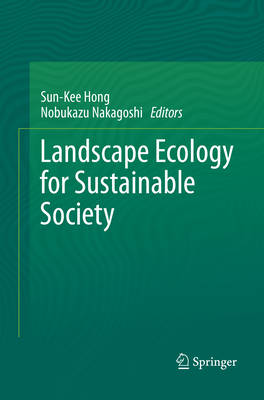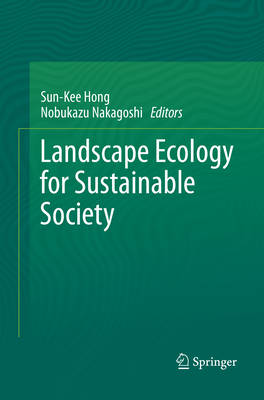
- Retrait gratuit dans votre magasin Club
- 7.000.000 titres dans notre catalogue
- Payer en toute sécurité
- Toujours un magasin près de chez vous
- Retrait gratuit dans votre magasin Club
- 7.000.000 titres dans notre catalogue
- Payer en toute sécurité
- Toujours un magasin près de chez vous
Landscape Ecology for Sustainable Society
Livre broché | Anglais
168,95 €
+ 337 points
Description
The research category of the landscape ecology, which researches the structure, functions, and the spatio-temporal changes of the ecological landscapes, has now been contributing to the human life and the shifts of the socio-economic paradigm. Global warming has been influencing the universal life patterns of the mankind which have been maintained in the past several hundreds of years. And it has been having the influences on the international social problems and economic problems. Although the diverse plans for adapting to the climate changes have been the topics of the conservations among the ecologists internationally, it is the reality that the speed of the changes of the environment has been quicker than the time it takes to complete the solutions. In order to maintain the sustainable earth and the sustainable society, the role of the landscape ecology has been coming to the fore. Especially, the theories and the methodologies of the landscape ecology have been applied to the multidisciplinary researches by going beyond the research category of ecology, including the maximization of the efficiencies of the land spaces, the management of the ecological space (habitats) in which the biological diversity can be maintained, the utilization of the resources that are absolutely needed by the human beings (Here, it is compressed to water, energy, and food), etc. and until reaching the human society. It is considered that, to that extent, the utilizations and the applications of the landscape ecology are very much needed for the diagnoses and the evaluations of the global environmental problems which have been proceeded with rapidly in the modernity.
This book is not comprised of any general remarks that explain the theories and the methods of the landscape ecology. Already, based on the basic theories of the landscape ecology, the writers have conducted the investigations on the farm villages, the cities, and the coastal ecosystems.And, through the space analyses and interpretations, the structure and functions of the landscapes were analyzed. Of course, in this book, too, the diverse ecosystems and the landscape ecological methodologies regarding the land use have been presented. However, the core of this book focuses more on what role the landscape ecology must play for the materialization of a sustainable society in the future. At the farm villages, the sustainable agriculture will be presented, and, at the cities, the discussions on the green networks and the energies will be proceeded with. Also, regarding the coasts and the seas, a thesis on the safety of the life zones of the residents adjacent to the sea and on the conservation of the island ecosystems will be presented. The sustainable society is a system that is formed by having the sustainable development as a basis. It is considered to be one aspect within a kind of a sustainable process with regard to which the natural world and the human world coexist and are in a symbiotic relationship harmoniously. In order to maintain the biodiversity, the reasonable adjustments of the human activities, like the use of the resources, are absolutely needed. Without the biological resources, the cultural diversity of the human beings, too, cannot exist. Consequentially, recently and internationally, there are a lot of the case examples that express the biocultural diversity by linking the biological diversity with the cultural diversity. In this book, the role of the landscape ecology as an academic link which can connect the two possible, if possible, is highly expected. It is, indeed, the biocultural landscape. It can be said that this concept, also, is the interconnection of the multidisciplinary spaces that must be dealt with in the modern landscape ecology. Through this book, it is intended to present a new directionality which can contribute to the sustainable society at the same time as the organization of the theories and the methods ofthe landscape ecology.
This book is not comprised of any general remarks that explain the theories and the methods of the landscape ecology. Already, based on the basic theories of the landscape ecology, the writers have conducted the investigations on the farm villages, the cities, and the coastal ecosystems.And, through the space analyses and interpretations, the structure and functions of the landscapes were analyzed. Of course, in this book, too, the diverse ecosystems and the landscape ecological methodologies regarding the land use have been presented. However, the core of this book focuses more on what role the landscape ecology must play for the materialization of a sustainable society in the future. At the farm villages, the sustainable agriculture will be presented, and, at the cities, the discussions on the green networks and the energies will be proceeded with. Also, regarding the coasts and the seas, a thesis on the safety of the life zones of the residents adjacent to the sea and on the conservation of the island ecosystems will be presented. The sustainable society is a system that is formed by having the sustainable development as a basis. It is considered to be one aspect within a kind of a sustainable process with regard to which the natural world and the human world coexist and are in a symbiotic relationship harmoniously. In order to maintain the biodiversity, the reasonable adjustments of the human activities, like the use of the resources, are absolutely needed. Without the biological resources, the cultural diversity of the human beings, too, cannot exist. Consequentially, recently and internationally, there are a lot of the case examples that express the biocultural diversity by linking the biological diversity with the cultural diversity. In this book, the role of the landscape ecology as an academic link which can connect the two possible, if possible, is highly expected. It is, indeed, the biocultural landscape. It can be said that this concept, also, is the interconnection of the multidisciplinary spaces that must be dealt with in the modern landscape ecology. Through this book, it is intended to present a new directionality which can contribute to the sustainable society at the same time as the organization of the theories and the methods ofthe landscape ecology.
Spécifications
Parties prenantes
- Editeur:
Contenu
- Nombre de pages :
- 383
- Langue:
- Anglais
Caractéristiques
- EAN:
- 9783030089658
- Date de parution :
- 09-12-18
- Format:
- Livre broché
- Format numérique:
- Trade paperback (VS)
- Dimensions :
- 155 mm x 235 mm
- Poids :
- 610 g






